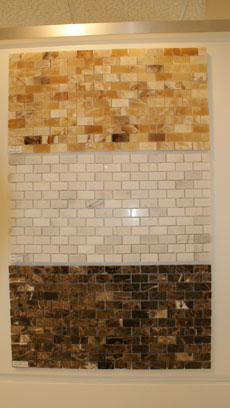
Over the years, an increasing number of kitchen countertop materials have been made available to building development companies, designers and homeowners. With so many options to choose from, it can be a daunting task to decide which material is best-suited for particular spaces and needs, particularly for homeowners who do not have expert knowledge of countertop materials and stone products.
Currently, countertop choices are vast and diverse. Some of the various types of countertop materials available today include:
-
Laminate;
-
Ceramic tile;
-
Solid surface materials;
-
Natural stone;
-
Engineered stone;
-
Stainless steel; and
-
Concrete.
The main difference between each type of countertop material is if it is organic, like natural stones, or man-made, like laminates. This difference between the two impacts the quality and performance of the piece, as well as the cost and value in terms of investment.
Two popular types of countertop materials are laminate, which is a man-made material, and natural stone, which tends to be more valued.
Laminate
Laminate countertops, similar to laminate flooring, consist of several layers pressed together, resulting in one piece or slab. More specifically, laminate countertops are made of layers of resin-treated paper that form into one piece after being exposed to high heat and pressure. Under this layer is a layer of composite chip wood, which forms the foundation of a laminate slab. Typically, thicker laminate pieces are used for flooring, countertops or another surface in which the piece will be placed horizontally. Thinner types are often used for areas where the pieces will be placed vertically, such as a washroom or kitchen backsplash.
The main reason why homeowners and designers will employ laminate kitchen countertops is the cost. Laminate is one of the least expensive countertop materials available. However, in terms of performance, laminate is not the best option, as they are prone to scratching and chipping. Also, if any water seeps through the resin-treated surface, it will result in swelling of the founding wood chip layer.
Natural Stone
Natural stone countertop materials include the following stones:
-
Marble;
-
Granite; and
-
Slate.
Natural stone kitchen tiles have a reputation for being exceptionally beautiful, adding immediate value to the space or home in which they are used. Granite and marble stones come in a diverse range of colours and varying patterns. Also contributing to the allure of natural stone products is their uniqueness. No two marble or granite slabs are exactly the same in appearance, making these slabs quite rare. However, all these factors contribute to the high cost of natural stone products. Marble, granite and slate slabs range in cost from approximately $50 US to $100 US per square foot. The main reason why natural stone products are used by homeowners and designers is to increase the value of a space while also employing particularly beautiful pieces. However, it is important to keep in mind the maintenance that goes into owning natural stone countertops.
Natural stones like marble, granite and slate are all porous, meaning that, like laminate countertops, they are prone to staining, scratching and chipping. However, with the proper level of care, staining and chipping can be avoided.
In comparison to other materials, natural stone requires a higher level of maintenance, but for many the beauty and functionality make its use worthwhile. Natural stone tiles should be sealed by the supplier and therefore, only require minimal daily cleaning that consists of a simple wipe down with a clean, damp chamois or micro-fiber cloth, followed by a dry cloth. Occasional maintenance consists of having kitchen countertops resealed either bi-annually or once a year.